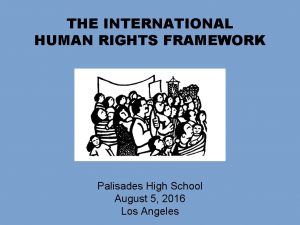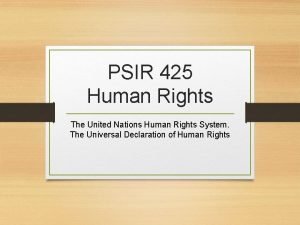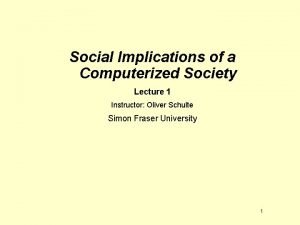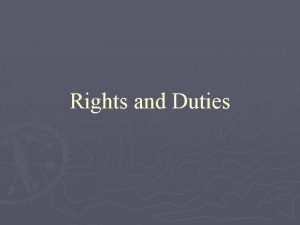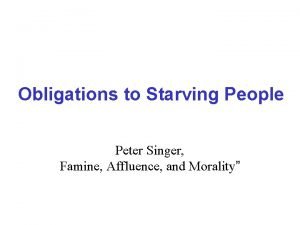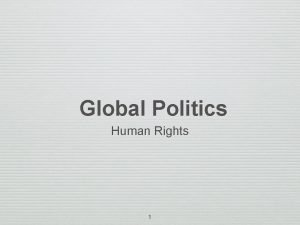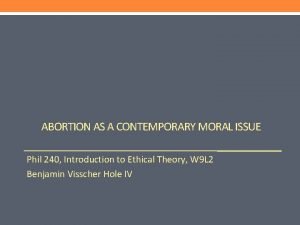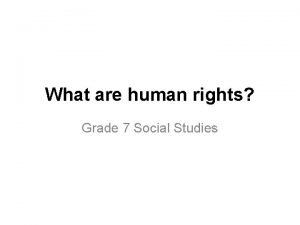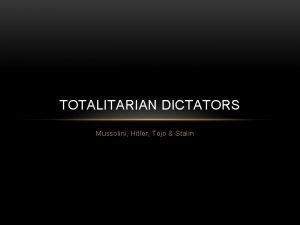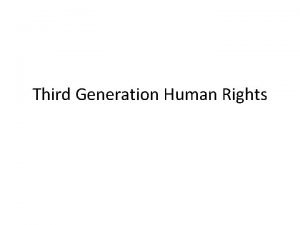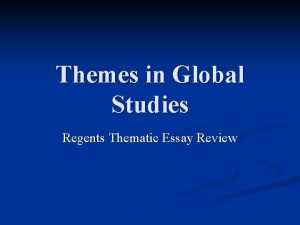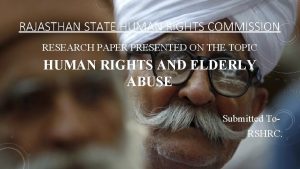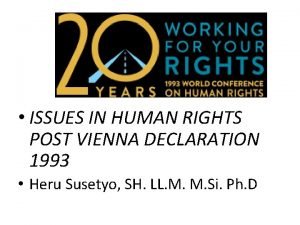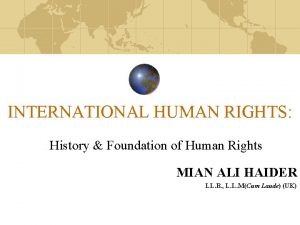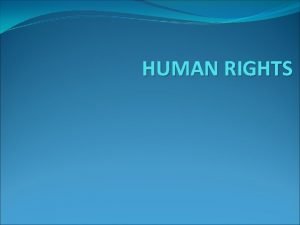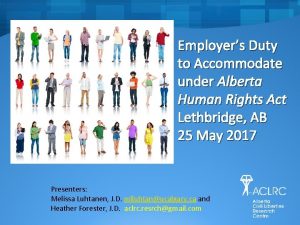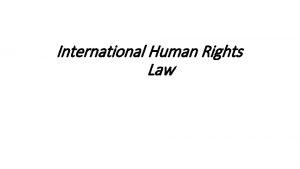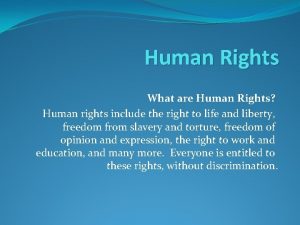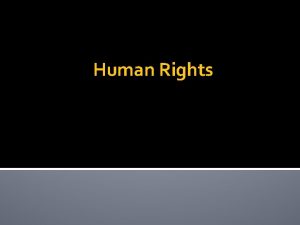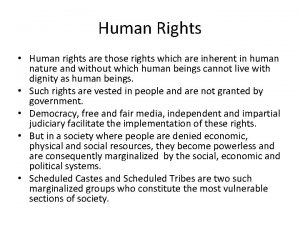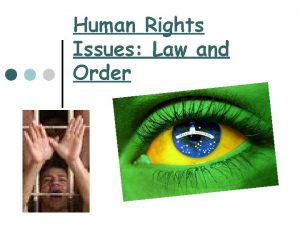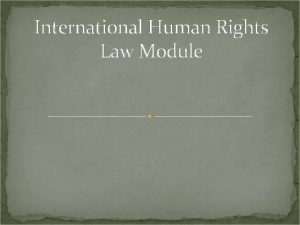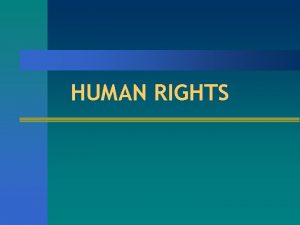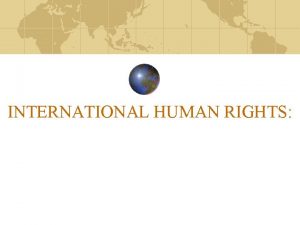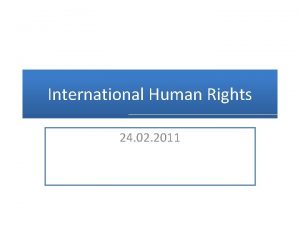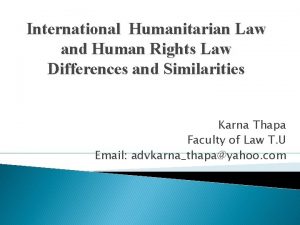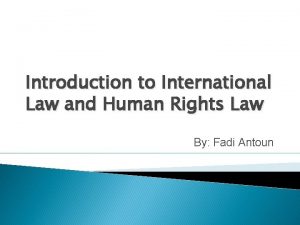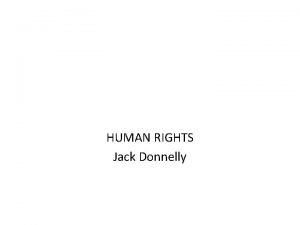INTERNATIONAL HUMAN RIGHTS LAW An Overview THE INTERNATIONAL



























- Slides: 27

INTERNATIONAL HUMAN RIGHTS LAW An Overview

THE INTERNATIONAL HUMAN RIGHTS SYSTEM Universal Declaration of Human Rights, 1948 GA Resolution | Not binding Truly a founding document? Art 1: ‘All human beings are born free and equal in dignity and rights’ Art 2: No discrimination Art 3 -21: Civil and political rights Art 17. Right to own property Art 22 -28: Economic, social and cultural rights Art 29: Limitations

THE TREATIES ‘International Bill of Rights’ – GA recommends inclusion of ESRs into HR Covenant in 1950; recommends split following ECOSOC request in 1952 (GA Res 543) Covenant on Economic, Social and Cultural Rights 1966 (ICESCR) Covenant on Civil and Political Rights 1966 (ICCPR) In force: 1976

ICCPR AND ICESCR ICCPR ICESCR Part I (Art 1): Self determination Part II: Non discrimination and fulfilment provisions Part III: Enumeration of rights Part IV: Oversight Part V: Non-obstante clauses Identical provisions in Arts 24 -25 Part VI: Validity, amendment, etc. Part V: Validity, amendment, etc.

THE TREATIES Convention on the Elimination of All Forms of Racial Discrimination 1965 (CERD) Women. Convention on the Elimination of All Forms of Discrimination against Women 1979 (CEDAW) OP 1999 Children. Convention on the Rights of the Child 1989 (CRC) OP-AC 2000; OP-SC 2000; OP-IC 2014 Migrant Workers. International Convention on the Protection of the Rights of All Migrant Workers and Members of their Families 1990 (ICRMW) Persons with Disabilities. Convention on the Rights of Persons with Disabilities 2006 (CRPD) OP 2006 Convention against Torture and Other Cruel, Inhuman or Degrading Treatment or Punishment 1984 (CAT) OP 2002 Convention for the Protection of All Persons from Enforced Disappearance 2006 (CPED)

THE TREATIES

CCPR AND CESCR: SOME PROVISIONS Article 1 (2) All peoples may, for their own ends, freely dispose of their natural wealth and resources without prejudice to any obligations arising out of international economic co-operation, based upon the principle of mutual benefit, and international law. In no case may a people be deprived of its own means of subsistence. Article 47 / Article 25 Nothing in the present Covenant shall be interpreted as impairing the inherent right of all peoples to enjoy and utilize fully and freely their natural wealth and resources.

CESCR: SOME PROVISIONS Article 15 1. The States Parties to the present Covenant recognize the right of everyone: (b) To enjoy the benefits of scientific progress and its applications; (c) To benefit from the protection of the moral and material interests resulting from any scientific, literary or artistic production of which he is the author.

CESCR: SOME PROVISIONS Article 11 1. The States Parties to the present Covenant recognize the right of everyone to … adequate food, clothing and housing, and to the continuous improvement of living conditions. The States Parties will take appropriate steps to ensure the realization of this right, recognizing to this effect the essential importance of international cooperation based on free consent. 2. The States Parties to the present Covenant, recognizing the fundamental right of everyone to be free from hunger, shall take, individually and through international co-operation, the measures, including specific programmes, which are needed: (a) To improve methods of production, conservation and distribution of food by making full use of technical and scientific knowledge, by disseminating knowledge of the principles of nutrition and by developing or reforming agrarian systems in such a way as to achieve the most efficient development and utilization of natural resources;

Non-discrimination and fulfilment ICCPR ICESCR Art 2 1. Each State Party … undertakes to respect and to ensure to all individuals within its territory and subject to its jurisdiction the rights … 1. Each State Party … undertakes to take steps … to the maximum of its available resources, with a view to achieving progressively the full realization of the rights … by all appropriate means, including particularly the adoption of legislative measures. 2. … each State Party … undertakes to take the necessary steps … to adopt such laws or other measures as may be necessary to give effect to the rights … Art 3 3. Each State Party … undertakes: (a) To ensure that any person whose rights or freedoms as herein recognized are violated 3. Developing countries, with due regard to human rights and their national economy, may determine to what extent they would guarantee the economic rights … to non-nationals.

FULFILMENT – ICESCR Interpreted as having some obligations of immediate effect: a) No discrimination b) Obligation to take steps: must be concrete, deliberate and targeted And ‘minimum core’ obligations (ESCR Committee) States must ensure the satisfaction of minimum essential levels of each of the rights A State party in which any significant number of individuals is deprived of essential foodstuffs, essential primary health care, basic shelter and housing, or most basic forms of education is, prima facie, failing to discharge its obligations

FULFILMENT Respect: Do not infringe rights Protect: Create environment in which rights enjoyed; third parties do not violate Due diligence obligation Fulfil: Ensure greater enjoyment of rights Can include obligations of result and conduct Legislative, judicial, administrative, educative etc. measures, remedies

OVERSIGHT VIA TREATY BODIES 1) Periodically receive and consider reports by states States: measures taken + difficulties encountered Committee: may also receive information from others Reports considered in public session. Idea of ‘constructive dialogue’ Issues ‘Concluding Observations’: progress + concern + specific recommendations + practical advice 2) Inter-state complaints Opt-in clause. No complaints received

TREATY BODIES 3) Individual communications Not anonymous. But CESCR provides state duty to ensure complainant protection Closed meetings. Oral hearings rare. Views determined by consensus (generally). Forwarded to state and individual 4) General Comments Interpretations of specific rights or treaty provisions Guidance on information to be submitted in State reports, Cross-cutting issues, e. g. role of NHRIs, rights of persons with disabilities, violence against women, rights of minorities How authoritative?

HOW AUTHORITATIVE ARE GENERAL COMMENTS? USA on Human Rights Committee: ECt. HR on Torture Committee: “[The ICCPR] scheme … does not impose on States Parties an obligation to give effect to the Committee’s interpretations or confer on the Committee the power to render definitive or binding interpretations of the Covenant. The drafters of the Covenant could have given the Committee this role but deliberately chose not to do so … The Committee’s position, while interesting, runs contrary to the Covenant scheme and international It has been argued that any rule of international law granting immunity to State officials has been abrogated by the Convention against Torture which, it is claimed, provides in its Article 14 for universal civil jurisdiction. This argument finds support from the Committee Against Torture. . . This interpretation has been rejected by courts in both Canada and the UK… The question whether that Convention has given rise to universal civil jurisdiction is therefore far from settled

Features of Human Rights Treaties (Some are controversial!) 1. ‘erga omnes’ obligations 2. ‘purpose’ is important: to interpretation of provisions and reservations 3. reservations incompatible with purpose of treaty may be disregarded 4. a State cannot withdraw human rights protections by terminating treaty 5. a State cannot claim a breach by another state as basis for terminating treaty (+ cannot adopt countermeasures that violate human rights obligations)

THE UN HUMAN RIGHTS SYSTEM UN General Assembly Human Rights Council Most Treaty Bodies Special Procedures ECOSOC Secretariat ESCR Committee Office of the High Commissioner for Human Rights

HUMAN RIGHTS COUNCIL Succeeded ‘Human Rights Commission’ in 2006 Reports to the UN General Assembly Intergovernmental body, 47 states Monitoring function: (1) Universal Periodic Review (2) Complaints mechanism (3) Special procedures

UNIVERSAL PERIODIC REVIEW Docs. Review Followup • National Report (20 pp) achievmts, challenges, priorities, requests for tech. asst. • OHCHR Compilation of UN Info (10 pp) obsvns and cmmts by treaty bodies & spl. procedures, etc. • OHCHR Summary of Stakeholders Info (10 pp): info from NGOs, NHRIs, academics, regional orgs • 3. 5 hr dialogue (UPR working Group, State, and observers). Outcome report: reccos, state response • 1 hr discussion in HRC: state can indicate acceptance/objection. NGOs, other states etc. may comment • Final outcome report adopted. Basis for follow-up at next review • Next review • Mid-term reports encouraged by Council • OHCHR, UN agencies, regional orgs and CSOs

COMPLAINTS PROCEDURE Patterns of gross and reliably attested violations Victims or others with reliable knowledge of violations Should not overlap with ongoing or decided complaint at another forum 11 -15 K complaints p. a. : screened by OHCHR. Handful go to Council Confidential

SPECIAL PROCEDURES ETC. § Working Groups & Special Rapporteurs, with thematic and country mandates § Urgent debates, during regular sessions or special sessions. § Issues such as economic and food crises, § Situations in particular states (multiple sessions on Israel, Syria)

Office of the High Commissioner of Human Rights Part of UN Secretariat for Treaty Bodies and Council Supports work of High Commissioner for Human Rights Key roles in promoting and protecting human rights include: Recos to UN bodies, rationalizing UN HR machinery; coordinating UN’s public info & education programmes Managing advisory, technical and financial assistance to states to fulfil human rights Rapid deployment in emergencies Growing field presence, for early warning and prevention

SOME ISSUES Fragmented system. Places great reporting burden on States. → All bodies emphasize coordination → Have sought to harmonize monitoring and reporting requirements What is monitored: (a) enjoyment of rights or (b) fulfilment of obligations or (c) states own monitoring of (a) or (b) → Use of nationally developed indicators; bodies monitoring → Efforts to develop international ‘illustrative’ indicators; but context & interpretation Compliance

“THIRD GENERATION” RIGHTS Self determination Right to development Environmental rights Right to natural resources - Collective rights (but, see below: European Commission describing ‘data protection’ as third generation right)

EUROPEAN PROTECTION OF HUMAN RIGHTS European Convention on Human Rights, 1950 (with several protocols) Ratification condition of membership of Co. E Sets out civil and political rights Protocol 1 Art 1: Right to peaceful enjoyment of possessions. Establishes European Court of Human Rights Interpretation and application of Convention Cases may be brought by States or Individuals, against States Effectiveness and Purpose| Proportionality analysis| Margin of appreciation Execution of judgments: supervised by the Co. E’s Committee of Ministers

EUROPEAN PROTECTION OF HUMAN RIGHTS European Social Charter, 1961 (revised 1996) Also part of Co. E, but membership not conditioned on ratification (most sts are parties) Economic and social rights States can choose provisions they do not wish to accede to Available to citizens, lawful residents only Compliance monitored by European Committee of Social Rights - Reporting procedure - Complaints mechanism (opt in via OP): employers’ orgs, trade unions, NGOs

EU CHARTER OF FUNDAMENTAL RIGHTS Proclaimed in 2000, binding on member states since 2009 (Treaty of Lisbon) Addressed to: (i) EU institutions and bodies; (ii) states only when implementing EU law Civil and political; economic, cultural and social rights - Art 17. Right to Property (incl. intellectual property) And third generation rights (e. g. data protection) Content of rights by reference to ECHR Does not provide additional mechanism for individual petitions; right to access CJEU under TFEU, if applicant affected ‘by reason of attributes peculiar to them’ or ‘by reason of circumstances in which they are differentiated from other persons’
 International bill of human rights
International bill of human rights International bill of human rights
International bill of human rights Negative rights vs positive rights
Negative rights vs positive rights What is littoral rights
What is littoral rights Characteristics of rights
Characteristics of rights Legal rights vs moral rights
Legal rights vs moral rights Positive and negative rights
Positive and negative rights Negative rights
Negative rights Negative rights vs positive rights
Negative rights vs positive rights Positive rights and negative rights
Positive rights and negative rights Newton's first law and second law and third law
Newton's first law and second law and third law Newton's first law of motion
Newton's first law of motion V=k/p
V=k/p Charles law constant
Charles law constant Nature of hrm
Nature of hrm What is rights in social studies
What is rights in social studies What evidence do you see of stalin being militaristic
What evidence do you see of stalin being militaristic First generation human rights
First generation human rights Theories of human rights
Theories of human rights Global regents thematic essay topics
Global regents thematic essay topics State human right commission rajasthan
State human right commission rajasthan Life orientation democracy and human rights
Life orientation democracy and human rights Vienna declaration of human rights
Vienna declaration of human rights Define human rights
Define human rights First generation of rights
First generation of rights Projects abroad human rights office
Projects abroad human rights office European human rights moot court competition
European human rights moot court competition Alberta human rights commission
Alberta human rights commission
